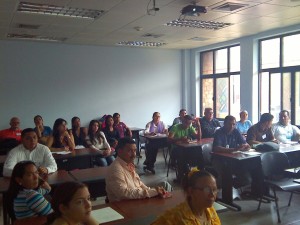
TheWashingtonPost/16-03-2016/ Por: Valerie Strauss
Resumen: Mas de 100 investigadores de la educación en California se han unido en un llamado para poner fin a las pruebas estandarizadas, debido a que consideran que no existe evidencia convincente para apoyar la idea de que los estándares estatales comunes mejorarán la calidad de la educación en los niños y su rendimiento, por el contrario, carecen de validez, fiabilidad y equidad. En este sentido, la Alianza de Investigadores de California para la equidad de la educación, representada por un grupo de investigadores de la educación superior (Universidad de Stanford, UCLA, Universidad de California en Berkeley), publicaron recientemente un informe en el que se describen las preocupaciones en torno a las normas básicas y las evaluaciones a las que son sometidos millones de estudiantes en California y otros estados del país, donde expresan que las pruebas causan daños a los estudiantes al no propiciar ni promover pensamiento crítico ni
aprendizajes significativos en los estudiantes, lo que incide en la disminución de tasa de graduación, el bajo rendimiento y la elevación de los índices de deserción escolar. Por su parte, la iniciativa Common Core Estándares se ha convertido en una cuestión política, donde los candidatos presidenciales han opinado sobre su consecución o eliminación, como fuerte de promesa electoral; lo cierto es que el informe redactado por el equipo de investigadores se inclina por explicar que la educación basada en estándares, nunca ha demostrado ser eficaz.
Se hace alusión, también que la nueva ley de educación, devuelve por parte del gobierno federal a los estados una buena cantidad de poder en el terreno educativo para la formulación de políticas que había sido utilizada por el gobierno de Obama de una forma sin precedentes.
Es importante, reseñar de esta noticia que California adoptó los Estándares Estatales Comunes desde 2010 y optó por alinearse con uno de los consorcios de prueba multi-estado financiados por la administración, que produce un
sistema de prueba conocida como la SBAC. Este grupo, así como la Asociación para la Evaluación de la preparación para universidad y carreras (que produjo evaluaciones PARCC), contratado con empresas de pruebas lidederes,
incluyendo A Perarson, el Educational Testing Service y CTB de la McGraw-Hill, con el fin de desarrollar nuevos exámenes, los cuales fueron tomados por los estudiantes en la primavera de 2015, con su consecuente
fracaso en los resultados, con indicadores por debajo de las competencias que debían adquirir. Además que el costo de la aplicación de las evaluaciones de la CCSS es alta e injustificadas, debido a que la concentración de esfuerzos y recursos financieros para lograr su acometida,ha desplazado otras prioridades como: reducción de clases, la
formación de profesores de calidad, la apertura de programas de artes, apertura a las ciencias, reemplazo de equipos de tecnología, entre otros.
More than 100 education researchers in California have joined in a call for
an end to high-stakes testing, saying that there is no “compelling”
evidence to support the idea that the Common Core State Standards will
improve the quality of education for children or close the achievement gap,
and that Common Core assessments lack “validity, reliability and fairness.”
The California Alliance of Researchers for Equity in Education, a
statewide collaborative of university-based education researchers, recently
released a research brief (see in full below below) describing concerns
with the Common Core standards and the assessments being given to millions
of students in California and other states around the country this spring.
What the Common Core tests are — and aren’t
The researchers, from public and private universities in California —
including Stanford University, UCLA, and the University of California
Berkeley — say that the Common Core standards themselves do not accomplish
what supporters said they would and that linking them to high-stakes tests
actually harms students. The brief says:
Although proponents argue that the CCSS promotes critical thinking skills
and student-centered learning (instead of rote learning), research
demonstrates that imposed standards, when linked with high-stakes testing,
not only deprofessionalizes teaching and narrows the curriculum, but in
so doing, also reduces the quality of education and student learning,
engagement, and success. The impact is also on student psychological
well-being: Without an understanding that the scores have not been proven
to be valid or fair for determining proficiency or college readiness,
students and their parents are likely to internalize failing labels with
corresponding beliefs about academic potential.
More specific to California: a recent study on the effects of high-stakes
testing, in particular of the CA High School Exit Examination (CAHSEE),
found no positive effects on student achievement and large negative
effects on graduation rates. The authors estimated that graduation rates
declined by 3.6 to 4.5 percentage points as a result of the state exit-exam
policy, and also found that these negative effects were “concentrated
among low-achieving students, minority students, and female students.”
The Common Core State Standards initiative has become a political issue,
with Republican presidential candidates, including front-runner Donald
Trump, repeatedly saying that if they become president, they will get rid
of the Core. In fact, no president can do that with executive power. While
the Obama administration supported the development of the Core and dangled
federal dollars in front of states to “persuade” state legislatures to
adopt the standards, 45 states and the District of Columbia each separately
went ahead and approved the math and English standards (though some later
decided to repeal or replace the standards). The administration provided
two multi-state consortia with some $360 million in federal funds to
develop new Core-aligned standards tests, which states could choose to
join. The federal government can’t directly dictate to a state what
standards and curriculum it must use.
Early in the development of the Core, there appeared to be little
controversy and bipartisan support. But after implementation began several
years — and was botched in many places — concern began to grow from across
the political spectrum, for different reasons. Some educators and
researchers questioned the way the standards were written (whether, for
example, there was any or enough input from working teachers) and some
criticized the content of the standards, especially for young children.
Some critics said standards-based education has never been shown to be
effective, and others felt the administration’s involvement usurped local
authority. Tea party members and even the Republican National Committee
jumped onto the anti-Core bandwagon, accusing the administration of a
federal takeover of public education, extreme right-wing rhetoric that clouded
a real discussion about the Core.
Donald Trump is wrong about Common Core — but he’s not the only candidate
who is
The administration’s support for the Core was one of the issues that
propelled critics to accuse the U.S. Education Department of micromanaging
local education issues and pushed Congress to finally move, last December,
to pass a successor bill to the widely disliked K-12 No Child Left Behind
law. The new law, the Every Student Succeeds Act, sends back from the
federal government to the states a good deal of education policymaking
power that had been used by the Obama administration in an unprecedented
manner.
The brief also says:
Overall, there is not a compelling body of research supporting the notion
that a nationwide set of curriculum standards, including those like the
CCSS, will either raise the quality of education for all children or close
the gap between different groups of children. Therefore attaching
high-stakes testing to the CCSS cannot be the solution for improving
student learning.
Yet, with the CCSS comes even more testing than before, and based on those
test scores, any number of high-stakes decisions may follow, all of which
are decisions using scientifically discredited methods, namely, the use of
value-added modeling that purport to attribute gains in test scores to such
factors.
California adopted the Common Core State Standards in 2010 and chose to
align with one of two multi-state testing consortia funded by the
administration. California signed up with the Smarter Balanced Assessment
Consortium, which produced a testing system known as the SBAC. That group,
as well as the Partnership for Assessment of Readiness for College and
Careers (which produced the PARCC assessments), contracted with leading
testing companies, including Pearson, the Educational Testing Service, and
CTB/McGraw-Hill, to develop the new exams. In 2013, California began
pilot-testing the SBAC exams, and in spring 2014 conducted widespread field
testing. Later that year, high-stakes summative and interim standardized
SBAC tests were administered; in spring 2015, several million students took
the SBAC, and, as predicted a majority of students failed.
The brief says:
Testing experts have raised significant concerns about all (SBAC, PARCC,
Pearson) assessments, including the lack of basic principles of sound
science, such as construct validity, research-based cut scores, computer
adaptability, inter-rater reliability, and most basic of all, independent
verification of validity. Here in California, the SBAC assessments have
been carefully examined by independent examiners of the test content who
concluded that they lack validity, reliability, and fairness, and should
not be administered, much less be considered a basis for high-stakes
decision making. When asked for documentation of the validity of the CA
tests, the CA Department of Education failed to make such documentation
public. Even SBAC’s own contractor, Measured Progress, in 2012 gave
several warnings, including against administering these tests on computers.
Nonetheless, CA has moved forward in full force. In spring 2015, 3.2
million students in California (grades 3-8 and 11) took the new,
computerized Math and English Language Arts/Literacy CAASPP tests
(California Assessment of Student Performance and Progress). The tests were
developed by SBAC, and administered and scored by Educational Testing
Service. Scores were released to the public in September 2015, and as many
predicted, a majority of students failed (that is, were categorized to be
below proficient). SBAC itself expected that pass rates would go down, and
would be particularly low for certain groups, including English-language
learners (who make up over 22% of the enrollment in CA public schools),
whom SBAC predicted would see an approximately 90% fail rate.
The impact in California of high-stakes assessments (CCSS or otherwise) is
not hard to predict. A compelling body of research exists on problems with
high-stakes testing that range from the scientific discrediting of
high-stakes testing to the disparate impact of high-stakes testing that
further widens educational inequities.
The research brief also cites these concerns:
The cost of implementing the CCSS assessments is high and unwarranted. The
CCSS testing costs for CA are estimated at $360 million dollars in
federal tax dollarsand $240 million dollars in state funds for three years
of administration and scoring. The CA general fund appropriation for pupil
testing in the 2014-2015 school year was $126,850,000. In practical terms,
this means that standardized testing has taken precedence over other
priorities such as class size reduction, quality teacher training
and retention, programs in the arts, adequate science and technology
equipment, and keeping neighborhoodschools open.
The technology and materials needed for CCSS assessments require high
and unwarranted costs. Much of these additional costs relate to
the computer-based assessments, which requireupgrading equipment
(computers, headphones, keyboards), bandwidth (for data-heavy tests
that include videos, animated graphics, and interactive charts), and
technical support in a short period of time, which means that
already-struggling schools will be disproportionately impacted.
The technology requirements raise concerns not only about cost, but also
about access. The CCSS assessments involve computer use not only for
the actual assessments, but also for the practiceassessments, and both
require that students have connectivity, computer access, and
computer familiarity. As such, CCSSassessments favor middle- and
high-income students who typically have easier access to technology,
Internet connectivity, and keyboard practice both inside and outside of
school.
The CCSS assessments have not provided for adequate accommodations for
students with disabilities and English-language learners, or for adequate
communication about such accommodations to teachers.
The researchers include a list of recommendations, including taking a new
look at appropriate standards and assessments, and placing a ban on
high-stakes testing until specific questions about proper accountability
for schools and students and teachers have been addressed.
Fuente:
www.washingtonpost.com/news/answer-sheet/wp/2016/03/16/education-researchers-blast-common-core-standards-urge-ban-on-high-stakes-tests/














 Users Today : 25
Users Today : 25 Total Users : 35460288
Total Users : 35460288 Views Today : 32
Views Today : 32 Total views : 3419000
Total views : 3419000